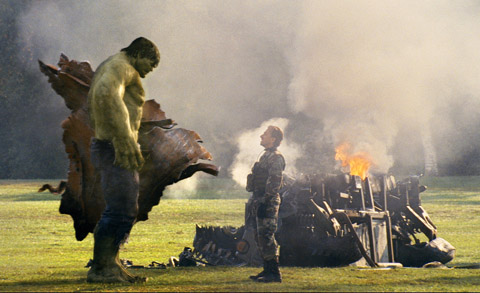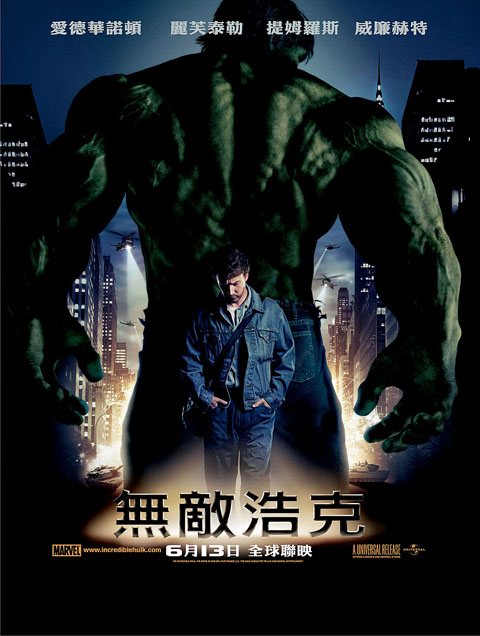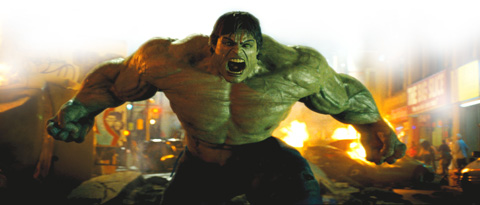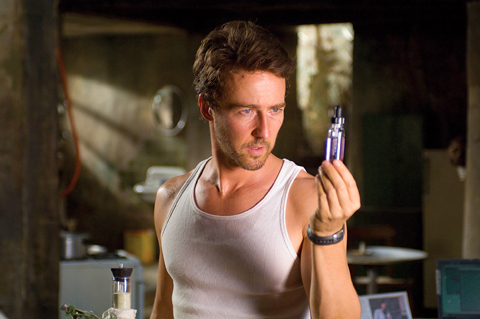The Incredible Hulk is no doubt an ideal version of the Hulk saga for those who found Ang Lee’s (李安) Hulk (2003) too talky or, dare I say, too thoughtful. But not for me. It sidesteps the intriguing aspects of Hulkdom and spends way too much time in, dare I say, noisy and mindless action sequences. By the time the Incredible Hulk had completed his hulk-on-hulk showdown with the Incredible Blonsky, I had been using my Timex with the illuminated dial way too often.
Consider the dilemma of creating a story about the Hulk, who is one of the lesser creatures in the Marvel Comics stable. You’re dealing with two different characters: mild-mannered scientist Dr Bruce Banner and the rampaging, destructive Hulk, who goes into frenzies of aggression whenever he’s annoyed, which is frequently, because the Army is usually unloading automatic weapons into him. There is even the interesting question of whether Dr Banner is really conscious inside the Hulk. In the Lee version, he was, more or less, and confessed to Betty Ross: “When it happens, when it comes over me, when I totally lose control ... I LIKE it.” In Louis Leterrier’s version, the best Banner can come up with is that being the Hulk is like a hyperthyroid acid trip, and all he can remember are fragments of moments.
It’s obvious that the real story is the tragedy that Bruce Banner faces because of the Hulk-inducing substance in his blood. If Banner never turned into the Hulk, nobody would ever make a movie about him. And if the Hulk were never Banner, he would be like Godzilla, who tears things up real good but is otherwise, dare I say, one-dimensional.

PHOTO COURTESY OF UIP
The Lee version was rather brilliant in the way it turned the Hulk story into matching sets of parent-child conflicts: Betty Ross (Jennifer Connelly) was appalled by her father the general (Sam Elliott), and Bruce Banner (Eric Bana) suffered at the hands of his father, a scientist who originally created the Hulk genes and passed them along to his child. (Nick Nolte had nice scenes as the elder Dr Banner.)
In the new version, Betty (Liv Tyler) still has big problems with her father the general (William Hurt); she’s appalled by his plans to harness the Hulk formula and create a race of super-soldiers. In both films, Banner (Ed Norton) and Ross are in love, but don’t act on it because the Hulk business complicates things way too much, although I admit there’s a clever moment in Hulk 2008 when Bruce interrupts his big chance to make love with Betty because when he gets too excited, he turns into the Hulk, and Betty is a brave girl but not that good of a sport.
Consider for a moment General Ross’ idea of turning out Hulk soldiers. They would be a drill sergeant’s worst nightmare. When they weren’t Hulks, why bother to train them? You’d only be using them in the fullness of their Hulkdom, and then how would you train them? Would you just drop thousands of Ed Nortons into enemy territory and count on them getting so excited by free-fall that they became Hulks? (This transformation actually happens to Banner in Hulk 2008, by the way.)

PHOTO COURTESY OF UIP
So. What’s to like in The Incredible Hulk? We have a sound performance by Ed Norton as a man who desperately does not want to become the Hulk, and goes to Brazil to study under a master of breath control in order to curb his anger. And we have Liv Tyler in full, trembling sympathy mode. Banner’s Brazilian sojourn begins with an astonishing shot: From an aerial viewpoint, we fly higher and higher above one of the hill cities of Rio, seeing hundreds, thousands, of tiny houses built on top of one another, all clawing for air. This is the City of God neighborhood, and as nearly as I could tell, we were looking at the real thing, not CGI. The director lets the shot run on longer than any reasonable requirement of the plot; my bet is, he was as astonished as I was, and let it run because it was so damned amazing.
The scenes involving Banner in Brazil are well-conceived, although when he accidentally contaminates a bottled soft drink with his blood, the movie doesn’t really deal with the consequences when the drink is consumed in the US. The contamination provides General Ross with his clue to Banner’s whereabouts, and Army troops blast the hell out of the City of God; all through the movie, the general deploys his firepower so recklessly that you wonder if he has a superior, and if he ever has to account for the dozens, hundreds, thousands, who die while his guys are blasting at the Hulk with absolutely no effect.
Enter Emil Blonsky (Tim Roth), a Marine General Ross recruits because he’s meaner and deadlier than anyone else. Blonsky leads the chase in Rio. Later, Banner’s research associate Dr Samuel Sterns (Tim Blake Nelson) is forced to inject Blonsky with a little Hulkie-juice, setting up a titanic rooftop battle in Harlem between Hulk and Blonsky. And this battle, as I have suggested, pounds away relentlessly, taking as its first victim our patience. Iron Man, the much better spiritual partner of this film, also ended with a showdown between an original and a copycat, but it involved two opponents who knew who they were and why they were fighting. When you get down to it, as a fictional creature, the Incredible Hulk is as limited as a bad drunk. He may be fun to be around when he’s sober, but when he drinks too much, you just feel sorry for the guy.

PHOTO COURTESY OF UIP

PHOTO COURTESY OF UIP

Following the shock complete failure of all the recall votes against Chinese Nationalist Party (KMT) lawmakers on July 26, pan-blue supporters and the Chinese Communist Party (CCP) were giddy with victory. A notable exception was KMT Chairman Eric Chu (朱立倫), who knew better. At a press conference on July 29, he bowed deeply in gratitude to the voters and said the recalls were “not about which party won or lost, but were a great victory for the Taiwanese voters.” The entire recall process was a disaster for both the KMT and the Democratic Progressive Party (DPP). The only bright spot for

As last month dawned, the Democratic Progressive Party (DPP) was in a good position. The recall campaigns had strong momentum, polling showed many Chinese Nationalist Party (KMT) lawmakers at risk of recall and even the KMT was bracing for losing seats while facing a tsunami of voter fraud investigations. Polling pointed to some of the recalls being a lock for victory. Though in most districts the majority was against recalling their lawmaker, among voters “definitely” planning to vote, there were double-digit margins in favor of recall in at least five districts, with three districts near or above 20 percent in

From Godzilla’s fiery atomic breath to post-apocalyptic anime and harrowing depictions of radiation sickness, the influence of the nuclear bombings of Hiroshima and Nagasaki runs deep in Japanese popular culture. In the 80 years since the World War II attacks, stories of destruction and mutation have been fused with fears around natural disasters and, more recently, the Fukushima crisis. Classic manga and anime series Astro Boy is called “Mighty Atom” in Japanese, while city-leveling explosions loom large in other titles such as Akira, Neon Genesis Evangelion and Attack on Titan. “Living through tremendous pain” and overcoming trauma is a recurrent theme in Japan’s

The great number of islands that make up the Penghu archipelago make it a fascinating place to come back and explore again and again. On your next trip to Penghu, why not get off the beaten path and explore a lesser-traveled outlying island? Jibei Island (吉貝嶼) in Baisha Township (白沙鄉) is a popular destination for its long white sand beach and water activities. However, three other permanently inhabited islands in the township put a unique spin on the traditional Penghu charm, making them great destinations for the curious tourist: Yuanbeiyu (員貝嶼), Niaoyu (鳥嶼) and Dacangyu (大倉嶼). YUANBEIYU Citou Wharf (岐頭碼頭) connects the mainland